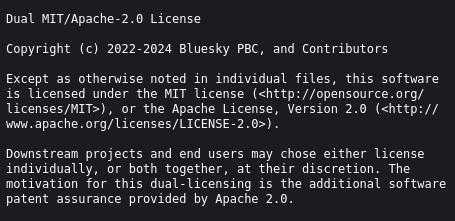I just finished a first read of @evan ‘s ActivityPub book from O’Reilly.
-
-
-
-
@viq @galactus @rysiek @evan @Mushi (Important nuance, possibly not super relevant to the conversation preceding: you can always *add* stuff. The version mismatch rules viq mentions only refer to *changing* stuff. So you could layer a second "application" with its own orthogonal data fields on top of AT, it's just if your implementation of the bluesky distributed application differs even a little from the Bluesky Social mothership you can get unpersoned. I am not impressed.)
-
Michał "rysiek" Woźniak · 🇺🇦replied to mcc last edited by
-
-
Please share how atproto is a proprietary protocol
According to the license file atproto is Dual MIT/Apache-2.0 License which you can view here: https://github.com/bluesky-social/atproto/blob/main/LICENSE.txt
Also included a screenshot

-
-
-
-
-
-
@okpierre @Mushi @galactus I've asked @bnewbold.net and @mmasnick.bsky.social about making a patent license for ATProto.
One way they could do it is to publish the protocol as a Report of a W3C community group, like the SocialCG or even a new community group, which would give it the patent licenses that open standards require.
This would make protocol experimentation much more reasonable.
Only the Bluesky team can do this.
-
@okpierre @Mushi @galactus @bnewbold.net @mmasnick.bsky.social I know that "open source" feels like it should be enough to be an "open standard", but unfortunately not. One of the hard things the distributed social network community have learned over the years is that the standards process matters.
-
@evan @okpierre @Mushi @galactus @bnewbold.net @mmasnick.bsky.social fascinating convo. It's interesting to say "open source" is not the same as "open standard" and that both are needed for true decentralization. That makes sense, but I'm not understanding what BSKY needs to change in order to be open standard.
Are you saying the code is open source, but still requires a proprietary piece (like a company-controlled server)?
-
@docpop @evan @Mushi @galactus @bnewbold.net @mmasnick.bsky.social
I'm glad I asked. This is more about the additional patent license that allows others to use the techniques patent free
It's misleading to say atproto is proprietary. I do wonder if Nostr can also be mislabeled the same way
-
@okpierre @docpop @Mushi @galactus @bnewbold.net @mmasnick.bsky.social
"4. Nonstandard and controlled by one particular organization."
-
@docpop @okpierre @Mushi @galactus @bnewbold.net @mmasnick.bsky.social there are two main things.
First is governance. Turning over the protocol to a multi-stakeholder standards organization like the IETF or W3C. As long as one company controls it, it's not open.
Second, like I said, is eliminating the other IP issues. Patents, trademarks, copyright. Those are usually handled by the IP agreements of standards organizations, or they also can be done unilaterally.
-
@okpierre @docpop @Mushi @galactus @bnewbold.net @mmasnick.bsky.social I agree that if your only understanding of the word "proprietary" is "not available under an OSI-approved license", it can be hard to comprehend the phrase "proprietary protocol" or "proprietary extension". The term is commonly used in standards circles, though.
-
@okpierre @docpop @[email protected] @Mushi @galactus @bnewbold.net @mmasnick.bsky.social You know, it's like the "proprietary" NodeInfo protocol used widely in the Fediverse or the "proprietary" protocol used by Mastodon compatible servers, which is related to AP but not conformant with it. This is the Fediverse protocol (rather than standard AP). In any case, I agree it's misleading to use the standards jargon in this way and I think it's not a good way to advocate for AP.


